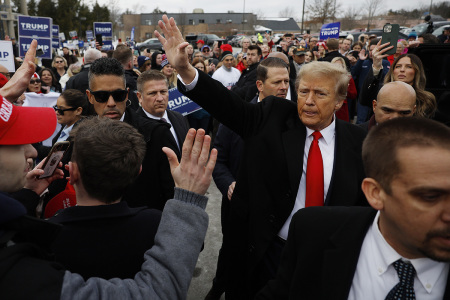Supreme Court rules unanimously Trump can’t be taken off Colorado ballot

The U.S. Supreme Court has unanimously ruled that Colorado cannot remove former President Donald Trump from the state ballot, arguing that the state overstepped its authority when doing so.
In December, the Colorado Supreme Court ruled that Trump was ineligible to be on the ballot for president, citing Section 3 of the Fourteenth Amendment to the U.S. Constitution.
But in the 9-0 decision released Monday morning in the case of Trump v. Anderson, the high court ruled that Congress, not states, enforces Section 3 of the 14th Amendment.
“We conclude that States may disqualify persons holding or attempting to hold state office. But States have no power under the Constitution to enforce Section 3 with respect to federal offices, especially the Presidency,” read the opinion.
"[N]othing in the Constitution delegates to the States any power to enforce Section 3 against federal officeholders and candidates. As an initial matter, not even the respondents contend that the Constitution authorizes States to somehow remove sitting federal officeholders who may be violating Section 3."
“The respondents nonetheless maintain that States may enforce Section 3 against candidates for federal office. But the text of the Fourteenth Amendment, on its face, does not affirmatively delegate such a power to the States,” the decision continued.
Supreme Court Justices Sonia Sotomayor, Elana Kagan and Ketanji Brown Jackson authored a concurring opinion, arguing that letting Colorado remove Trump from its ballot “would, we agree, create a chaotic state-by-state patchwork, at odds with our Nation’s federalism principles.”
However, the justices took issue with the per curiam opinion’s stance that the decision decides future cases by simply putting the responsibility of 14th Amendment disqualification to Congress.
“The majority announces that a disqualification for insurrection can occur only when Congress enacts a particular kind of legislation pursuant to Section 5 of the Fourteenth Amendment,” they added.
“In doing so, the majority shuts the door on other potential means of federal enforcement. We cannot join an opinion that decides momentous and difficult issues unnecessarily, and we therefore concur only in the judgment.”
The Colorado Supreme Court ruled 4-3 on Dec. 19 that Trump cannot be placed on the ballot for the 2024 election, citing his alleged connection to the Jan. 6, 2021, U.S. Capitol riot.
The court cited Section 3 of the 14th Amendment of the U.S. Constitution, which prohibits people from holding public office who “engaged in insurrection or rebellion against the same, or given aid or comfort to the enemies thereof."
"President Trump is disqualified from holding the office of President under Section Three; because he is disqualified, it would be a wrongful act under the Election Code for the Secretary to list him as a candidate on the presidential primary ballot," read the Colorado high court’s majority.
"We do not reach these conclusions lightly. We are mindful of the magnitude and weight of the questions now before us. We are likewise mindful of our solemn duty to apply the law, without fear or favor, and without being swayed by public reaction to the decisions that the law mandates we reach."
Colorado Chief Justice Brian Boatwright authored a dissent to the opinion, arguing that the court went beyond its scope when it decided Trump had engaged in insurrection.
"Unlike qualifications such as age and place of birth, an application of Section Three requires courts to define complex terms, determine legislative intent from over 150 years ago, and make factual findings foreign to our election code," wrote Boatwright.
"Dismissal is particularly appropriate here because the Electors brought their challenge without a determination from a proceeding (e.g., a prosecution for an insurrection-related offense) with more rigorous procedures to ensure adequate due process."
Trump, the frontrunner for becoming the 2024 Republican nominee for president, filed an appeal with the U.S. Supreme Court, which heard oral arguments last month.
During oral arguments, multiple justices of the high court expressed concern about states having the power to enforce the 14th Amendment and if this interferes with the wishes of other states.






















